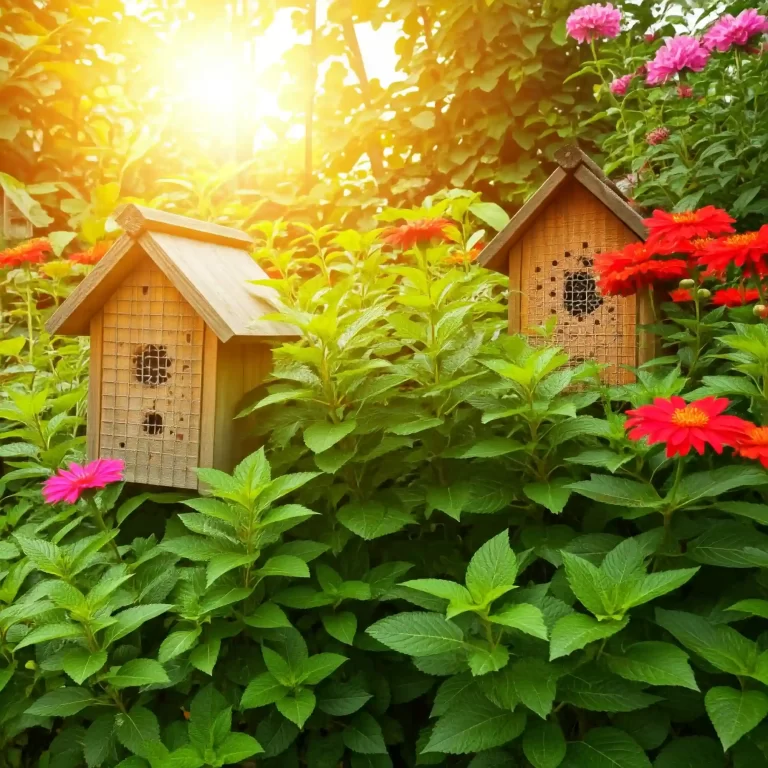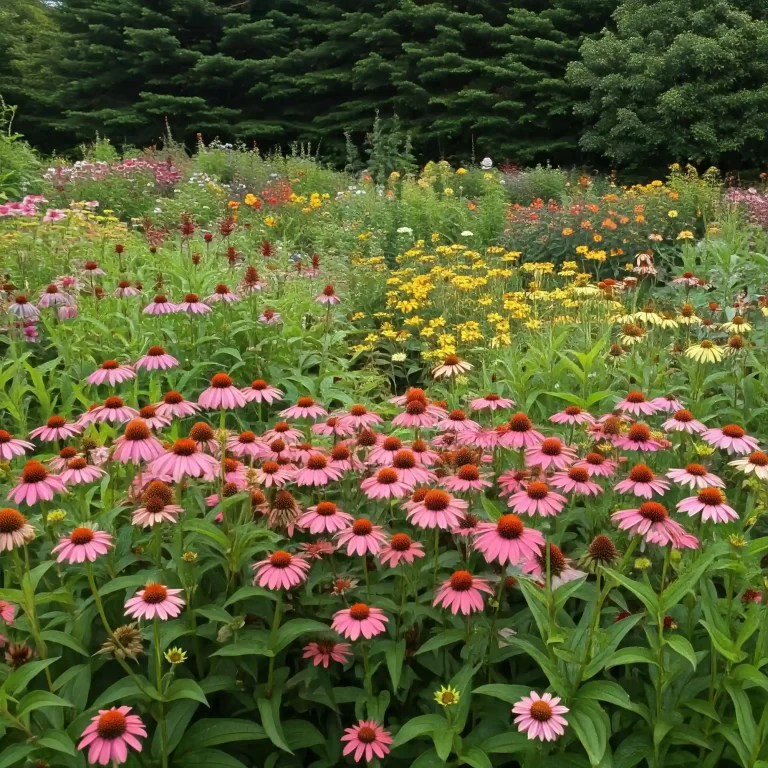This guide unlocks the secrets to creating a flourishing garden that thrives naturally. Ditch the harsh chemicals and embrace a holistic approach that fosters a healthy environment for your plants and attracts beneficial creatures. Here’s what you’ll learn:
- The magic of balanced ecosystems: Discover how a web of healthy soil, diverse plants, and helpful insects creates a haven for your veggies and flowers.
- Benefits galore: Learn how balanced ecosystem gardening reduces your reliance on pesticides, improves plant health, and promotes a more sustainable approach.
- Actionable steps: Get your hands dirty with practical tips on building a balanced ecosystem garden, from choosing the right plants to promoting biodiversity.
What is Balanced Ecosystem Gardening? Cultivating a Paradise
Imagine a garden bursting with life: vibrant flowers, flourishing vegetables, and a gentle hum of activity. Balanced ecosystem gardening makes this dream a reality. It’s a method that moves away from the mentality of battling pests and instead focuses on creating a healthy environment where your plants can thrive naturally.
This approach fosters a complex web of life within your garden. Here’s the breakdown:
- Healthy Soil: Rich, fertile soil teeming with beneficial microbes provides essential nutrients for your plants and fosters a thriving underground ecosystem.
- Diverse Plant Selection: Planting a variety of flowers, herbs, and vegetables creates a diverse habitat that attracts a wider range of beneficial insects.
- Companion Planting: Strategically placing certain plants together can deter pests and encourage beneficial insects.
- Beneficial Insects: Ladybugs, lacewings, and parasitic wasps are nature’s pest control squad, preying on harmful insects and keeping their populations in check.
By promoting these elements, you create a balanced ecosystem where plants have the natural defenses they need to resist pests and diseases.
The Benefits of Balanced Ecosystem Gardening: A Gardener’s Delight
Balanced ecosystem gardening isn’t just about creating a beautiful space; it offers a multitude of benefits for you, your plants, and the environment.
- Reduced Reliance on Pesticides: Say goodbye to harsh chemicals! By encouraging beneficial insects and creating a healthy environment, you naturally reduce pest populations and the need for harmful pesticides.
- Improved Plant Health: Strong, healthy plants grown in a balanced ecosystem are more resistant to diseases and pests. This translates to better yields and less frustration in the garden.
- Sustainable Approach: Balanced ecosystem gardening promotes natural solutions and reduces reliance on chemical fertilizers and pesticides. This creates a more sustainable and environmentally friendly gardening practice.
- Increased Biodiversity: A diverse garden attracts a wider range of insects, birds, and other pollinators. This not only benefits your plants but also contributes to a healthier local ecosystem.
- A Natural Haven: Balanced ecosystem gardening fosters a more natural and balanced environment in your garden. Enjoy the sights and sounds of a thriving ecosystem while reaping the rewards of healthy, homegrown produce.
Building Your Balanced Ecosystem Garden: A Step-by-Step Guide
Ready to create your own thriving, pest-resistant paradise? Here’s a practical guide to get you started:
1. Laying the Foundation: Healthy Soil is Key
- Test and Amend: Understanding your soil’s composition is crucial. Conduct a simple soil test to determine its pH level and nutrient content. Amend your soil with organic matter like compost or aged manure to improve drainage, fertility, and microbial activity.
- Composting is King: Composting kitchen scraps and yard waste provides a constant source of nutrient-rich organic matter for your soil. This not only benefits your plants but also reduces waste going to landfills.
2. Plant Power: Choosing the Right Plants for a Balanced Ecosystem
- Diversity is Your Friend: Plant a variety of vegetables, herbs, and flowers. This creates a diverse habitat for beneficial insects and disrupts the life cycles of pests who prefer monoculture environments.
- Native Plants: Opt for native plants whenever possible. They’re naturally adapted to your local climate and soil conditions, and often attract beneficial insects that have co-evolved with them.
- Beneficial Blooms: Include flowering plants like marigolds, calendula, and borage. These attract pollinators and beneficial insects like ladybugs and lacewings.
Companion Planting Powerhouses
| Plant | Companion Plants | Deters |
|---|---|---|
| Tomatoes | Basil, Marigolds, Nasturtiums | Aphids, Whiteflies, Tomato hornworms |
| Peppers | Basil, Marigolds | Aphids |
| Lettuce | Carrots, Radishes | Cabbage moths |
| Carrots | Onions | Carrot flies |
Remember: Research specific companion planting strategies for your chosen vegetables and herbs to maximize their effectiveness.
Inviting the Good Guys: Attracting Beneficial Insects
Beneficial insects are the backbone of a balanced ecosystem garden. They act as natural pest control, preying on harmful insects and keeping their populations in check. Here’s how to attract them to your garden:
- Provide Food and Shelter: Flowering plants with diverse pollen and nectar sources are a magnet for beneficial insects like bees, ladybugs, and hoverflies. Include plants that bloom throughout the season to provide a continuous food supply. Additionally, consider offering shelter options like strategically placed rocks, logs, or dedicated insect hotels.
- Limit Pesticides: Harsh chemicals not only kill harmful insects but also harm beneficial ones. Opt for organic pest control methods whenever possible, such as using insecticidal soap or neem oil for targeted pest control.
- Let it Be Wild: Resist the urge to create a perfectly manicured garden. Leaving some areas with a bit of wild growth provides additional habitat and food sources for beneficial insects. A little controlled chaos goes a long way!
Beneficial Bug Brigade
| Beneficial Insect | Prey |
|---|---|
| Ladybugs | Aphids, Scales, Mealybugs |
| Lacewings | Aphids, Mealybugs, Caterpillars |
| Parasitic Wasps | Aphids, Caterpillars, Beetles |
| Hoverflies | Aphids, Scales, Whiteflies |
| Ground Beetles | Slugs, Snails, Cutworms |
Remember: Patience is key! It may take some time for a healthy population of beneficial insects to establish itself in your garden.
Maintaining the Balance: Ongoing Care for Your Ecosystem
Building a balanced ecosystem garden is an ongoing process. Here are some essential practices to keep your haven thriving:
- Mulch Magic: Apply a layer of organic mulch around your plants. This helps retain moisture, suppress weeds, and provides habitat for beneficial insects living in the soil.
- Watering Wisely: Water your plants deeply and infrequently, encouraging them to develop strong root systems. Avoid overwatering, which can attract unwanted pests and diseases.
- Monitor and Adapt: Regularly observe your garden for signs of pest problems or plant diseases. Take action early with organic methods whenever possible. By understanding the dynamics of your ecosystem, you can adapt your approach over time.
Conclusion: Cultivating a Garden Oasis with Balanced Ecosystems
Balanced ecosystem gardening offers a rewarding approach to creating a thriving and resilient garden. By fostering a healthy environment, attracting beneficial insects, and adopting sustainable practices, you can cultivate a garden oasis that’s not only beautiful but also in harmony with nature. So, ditch the chemicals, embrace the natural world, and watch your garden flourish!


